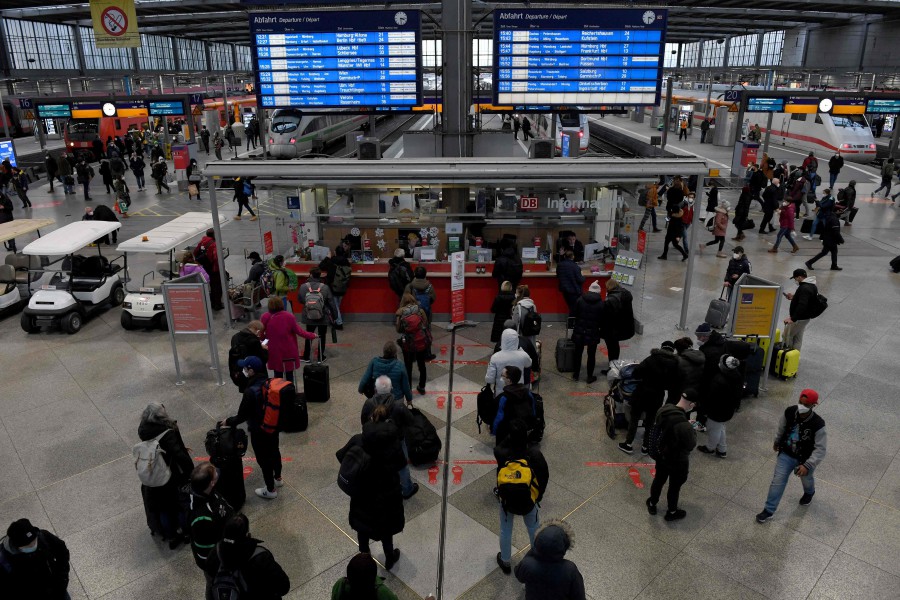
BERLIN, Dec 3 (NNN-AGENCIES) — Germany unveiled strict curbs on the unvaccinated Thursday as alarm fanned worldwide over the Omicron variant, and Joe Biden announced America’s winter battle plans against Covid-19 as signs of community transmission of the new strain began showing in the US.
The discovery of the new Omicron variant, first reported to the World Health Organization by South Africa on Nov 24, has spread worldwide rapidly, as the EU health agency warned the strain could cause more than half of Europe’s Covid cases in the “next few months.”
More than two dozen countries and territories have now detected cases, including India on Thursday and the United States on Wednesday, among the countries hardest-hit by the coronavirus pandemic since it first emerged nearly two years ago.
The WHO has cautioned that it could take weeks to discover if Omicron is more transmissible, and whether it causes more severe disease – as well as how effective current treatments and vaccines are against it.
But a new preliminary study by South African researchers suggests it is three times more likely to cause reinfections compared to the Delta or Beta strains, the first epidemiological evidence about Omicron’s ability to evade immunity from prior infection.
The paper, which has not yet been peer reviewed, was praised by Michael Head, a scientist at the University of Southampton.
“This analysis does look very concerning, with immunity from previous infections being relatively easily bypassed. Might this all still be a ‘false alarm’? That is looking less and less likely,” he said.
The variant’s detection and spread represent a fresh challenge to global efforts to battle the pandemic, with several nations already reimposing restrictions many had hoped were a thing of the past.
In Berlin, outgoing German Chancellor Angela Merkel announced that large parts of public life in Germany would be shut off to people who have not been vaccinated or have not recovered from Covid-19, in an attempt to clamp down on surging infection rates fuelled by the Delta variant.
“Culture and leisure nationwide will be open only to those who have been vaccinated or recovered,” Merkel said. The German parliament is due to vote on mandatory immunisations.
It is not yet clear when the latest measures will go into effect.
But the plans include a blanket ban on entering bars, restaurants and cinemas for anyone who is unvaccinated or not recovered from Covid, according to a document signed off by leaders.
The agreement also includes new restrictions on large gatherings – which would affect events such as Bundesliga football matches – and the closure of nightclubs in areas with a weekly incidence rate above 350 infections per 100,000 people.
Fireworks will be banned on New Year’s Eve to stop large crowds from gathering, according to North Rhine-Westphalia state premier Hendrik Wuest.
On Thursday, Norway introduced new anti-Covid measures in greater Oslo after a suspected cluster of Omicron cases emerged among dozens of vaccinated people who attended a Christmas dinner last week. So far, one Omicron case in the cluster has been confirmed.
Face masks will be mandatory in public transport, shopping centres, shops and taxis when social distancing is not possible. People will have to work from home if possible, and the number allowed to gather at indoor private events will be limited to 100, the government said.
Rising Delta infections had already seen European governments reintroduce mandatory mask-wearing, social distancing measures, curfews or lockdowns in a desperate attempt to limit hospitalisations, leaving businesses fearing another grim Christmas.
WHO chief Tedros Adhanom Ghebreyesus has warned of a “toxic mix” of low vaccination and testing rates creating a “recipe for breeding and amplifying variants.”
In Belgium, Health Minister Frank Vandenbroucke spoke of “chaos” in Flemish schools as cases soared and the country’s leading region Flanders called for new measures.
The United Nations said Thursday that the pandemic has pushed 20 million more people into poverty, estimating that 274 million people would need emergency assistance next year, up 17 percent on 2021, as economies suffer with Covid-19 restrictions. — NNN-AGENCIES




